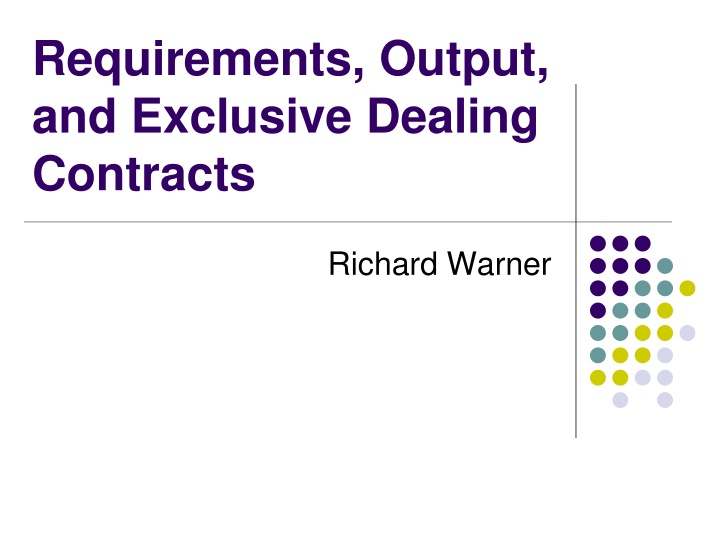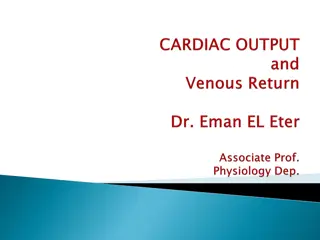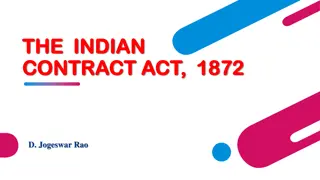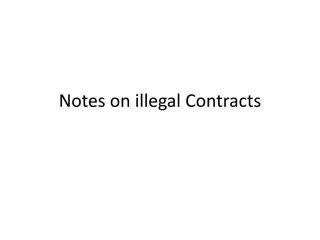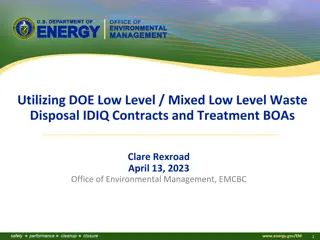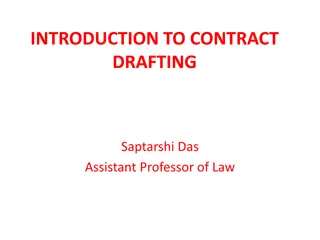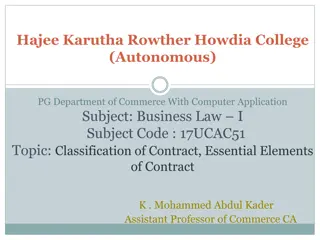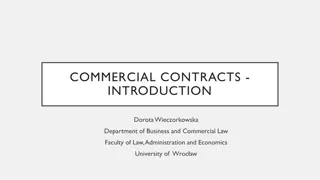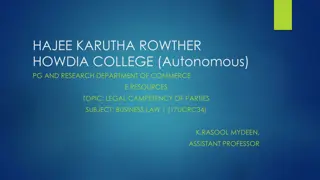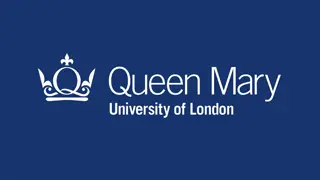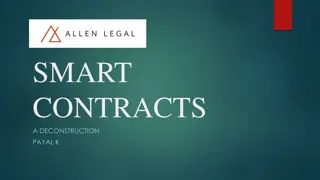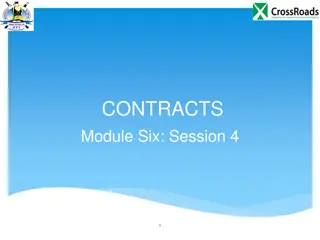Contracts: Requirements, Output, and Exclusive Dealing
In this legal case study, explore the implications of requirements contracts based on the relationship between Laclede and Amoco. The matter revolves around mutuality of consideration, implied promises, and the practical implications of such agreements. Analyze the nature of exclusive dealing contracts and the associated obligations and limitations.
Download Presentation

Please find below an Image/Link to download the presentation.
The content on the website is provided AS IS for your information and personal use only. It may not be sold, licensed, or shared on other websites without obtaining consent from the author.If you encounter any issues during the download, it is possible that the publisher has removed the file from their server.
You are allowed to download the files provided on this website for personal or commercial use, subject to the condition that they are used lawfully. All files are the property of their respective owners.
The content on the website is provided AS IS for your information and personal use only. It may not be sold, licensed, or shared on other websites without obtaining consent from the author.
E N D
Presentation Transcript
Requirements, Output, and Exclusive Dealing Contracts Richard Warner
Laclede v. Amoco Amoco promises sell to propane to Laclede. Amoco Laclede Laclede promised buy propane gas at such times and in such volumes commensurate with (Laclede's) requirements The issue in this case is whether or not the contract fails for lack of mutuality of consideration because Laclede did not expressly bind itself to order all of its propane requirements for the Jefferson County subdivisions from Amoco. Why? Because its requirements could be zero.
Why Does This Matter? Amoco s propane delivery outlet for Laclede Laclede s connection to Amoco s outlet. Laclede was to (i)nstall, own, maintain and operate all distribution facilities from the point of delivery as defined in Paragraph 3(b) . . . . Paragraph 3(b) provided: the point of delivery shall be at the outlet of (Amoco) header piping. Also under Paragraph 3(b) Amoco was to own and operate all the facilities on the bulk side of that header piping.
A Requirements Contract Laclede thus bound itself to buy all its requirements from Amoco by agreeing to attach its distribution lines to Amoco's header piping; and even if a change of suppliers could be made under the contract, Laclede could not own and operate a separate distribution system hooked up to some other supplier's propane storage tanks without substantially altering the supply route to its distribution system or making a very substantial investment in its own storage equipment and site. As a practical matter, then, Laclede is bound to buy all the propane it distributes from Amoco in any subdivision to which the supplemental agreement applies and for which the distribution system has been established. When analyzed in this manner, it can be seen that the contract herein is simply a so-called requirements contract. Such contracts are routinely enforced by the courts where, as here, the needs of the purchaser are reasonably foreseeable and the time of performance is reasonably limited.
The Implied Promise The court implies a promise by Laclede to (1) buy all it requires from Amoco, and (2) to ensure that its needs of are reasonably foreseeable and the time of performance is reasonably limited. The implied promise is consideration for Amoco s promise.
A Requirements Contract? Alice promise to buy 100 hula hoops a month from Bob. Bob and Alice have a requirements contract. (a) True (b) False
The Same Approach For Goods A good (in the legal sense) is a tangible, moveable item. Tangible distinguishes goods from intellectual property. Moveable distinguishes goods from real estate. Goods and services are distinct. Note the Laclede court treats the contract as one for a service the delivery of propane. The UCC is the law on sale of goods not the common law.
UCC 2-306 Implied promise Good faith obligation Best effort obligation Output contract conduct his business in good faithso output reasonably foreseeable Requirements contract Exclusive dealing contract conduct his business in good faithso requirements reasonably foreseeable obligation by the seller to use best efforts to supply the goods and by the buyer to use best efforts to promote their sale.
2-306. Output, Requirements and Exclusive Dealings. (1) A term which measures the quantity by the output of the seller or the requirements of the buyer means such actual output or requirements as may occur in good faith, except that no quantity unreasonably disproportionate to any stated estimate or in the absence of a stated estimate to any normal or otherwise comparable prior output or requirements may be tendered or demanded. (2) A lawful agreement by either the seller or the buyer for exclusive dealing in the kind of goods concerned imposes unless otherwise agreed an obligation by the seller to use best efforts to supply the goods and by the buyer to use best efforts to promote their sale.
Official Comment Purposes: . . . 2. Under this Article, a contract for output or requirements . . . does [not] lack mutuality of obligation since, under this section, the party who will determine quantity is required to operate his plan or conduct his business in good faith and according to commercial standards of fair dealing in the trade so that his output or requirements will approximate a reasonably foreseeable figure. Reasonable elasticity in the requirements is expressly envisaged by this section and good faith variations from prior requirements are permitted even when the variation may be such as to result in discontinuance.
Official Comment 5. Subsection (2), on exclusive dealing, makes explicit the commercial rule embodied in this Act under which the parties to such contracts are held to have impliedly, even when not expressly, bound themselves to use reasonable diligence as well as good faith in their performance of the contract. Under such contracts the exclusive agent is required, although no express commitment has been made, to use reasonable effort and due diligence in the expansion of the market or the promotion of the product, as the case may be.
